Survey Results- Part 2 – Measuring Discipleship
In attempting to measure discipleship, I loosely followed Gallup Press’s model for measuring spiritual commitment by asking 11 questions related to personal religious experience. We ranked the response 1 (strongly disagree) to 5 (strongly agree). Before we dive into any comparative analysis, let’s first look at the questions with their average score from the sample set and the percent for each question which scored a 5.
As can be seen, the lowest scoring response was for reading the scriptures everyday, with about a 50/50 split on the agreeing and disagreeing respondents here, and only 13% feeling they could strongly agree that they read the scriptures daily. In that the total discipleship score is merely an average of all the other discipleship questions, this made the group which answered 5 to all questions very small.
The breakout for average total discipleship was as follows:
You can see that most respondents fell into the neutral and tentative agreement section, with very few in disagreement. This makes breakout analysis risky, but hey, I’m gonna do it anyway.
With this in mind, I am going to show the rest of the graphs in this post as % break outs of each bucket. So while some buckets may be teeny tiny and thus prone to error, I think the potential story they tell is interesting nonetheless, and worth consideration.
So for example:
This one is fairly obvious, considering one of the questions of discipleship is whether one attends church, but those who did not consider themselves members who took the survey dominated the low end of discipleship, while those who were members controlled the rest of the board.
Converts who were interested enough to take the survey fell somewhat evenly from low to highest discipleship, but evaded the lowest are of discipleship.
People are always asking why the general authorities are always talking like women are more spiritual than men. Now we know.
People without callings generally correlate to a low sense of discipleship, but even a small subset of those with the highest level of discipleship do not have callings.
The High end of discipleship is dominated by those who attend church weekly, the low end by those who never attend.
This one takes some explaining. I took the questions relating to evolution, polygamy, etc, and calculated a form of doctrinally certainty, where if a responded with strong opinions either in agreement or disagreement to a give question, they were considered more doctrinally certain, while people who were apt to label everything a 3 were considered doctrinally uncertain and so on. As a surprise here, those with higher levels of discipleship were more much less likely to be doctrinally certain, with those who answered with certainty (either in agreement or disagreement) all ended up on the lowest end of discipleship.
Also in the survey, I asked two questions about the enjoyment of sacrament meeting. There is a clear step here, with the high end having the greatest willingness to enjoy sacrament meeting, while the lowest in discipleship clearly do not consistently enjoy it.
Last, I used the questions from the engagement section of the survey (similar to this post) to rate each individual’s general engagement in the church, and as advertised, there is a very clear correlation between Engagement at Church and Discipleship.
Up Next- Desired Outcomes of discipleship and More Engagement.
Appendix:
Since there were so many questions relating to doctrinal certainty. I wanted to add some nuance here. Again I simply recalculated the answers to “doctrinal” questions to be 1-3, then I took the average of all the questions, with those closest to 1 being the most neutral and those closest to 3 being the most certain.
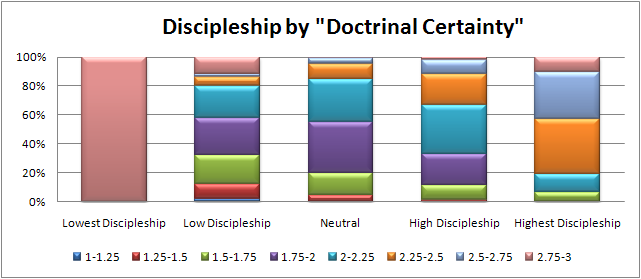
To me this mainly says this data is inconclusive. Any other opinions?

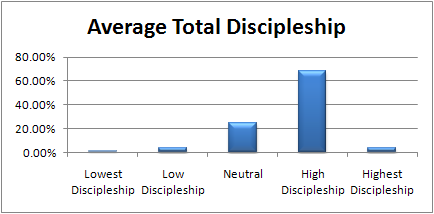
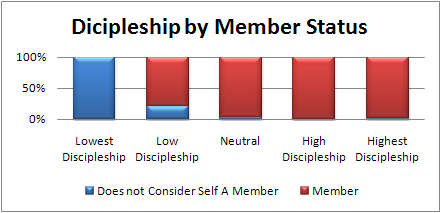
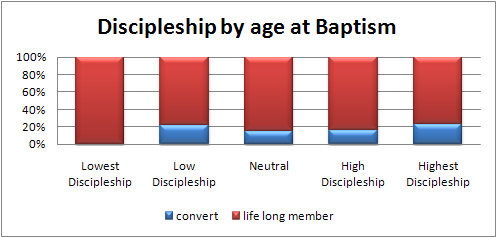
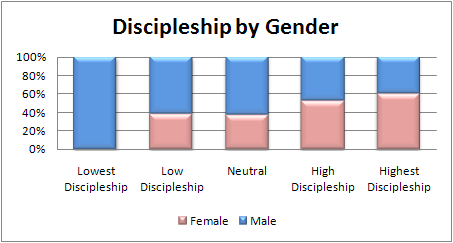
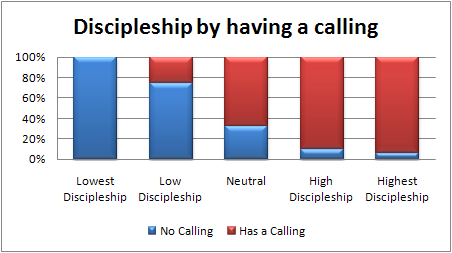
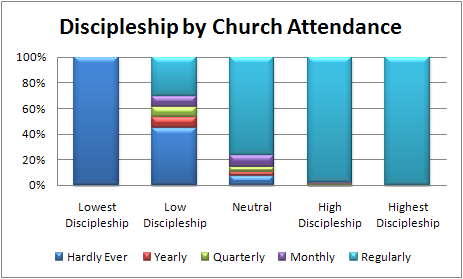
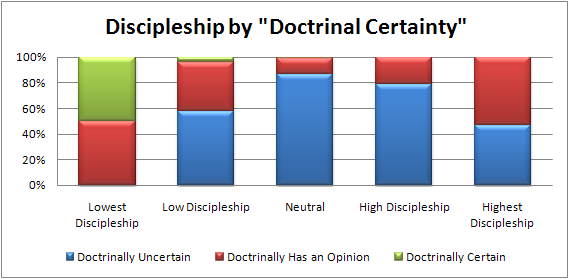
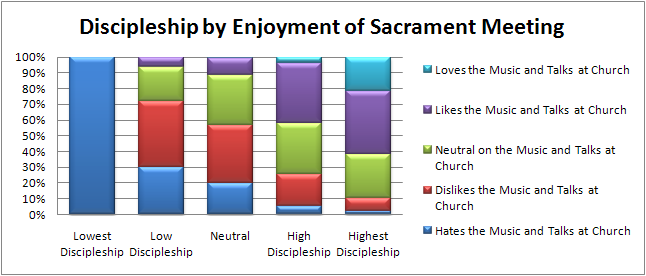
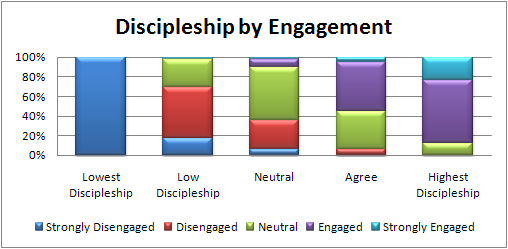


That doctrinal certainty vs. discipleship chart is the most interesting of the bunch.
One possible conclusion from that is that avid disciples in the church are truth seekers — or at least have a certain epistemological humility. The people who are most certain they have the answers on doctrinal questions are less devout Mormons in this sample.
The beauty of that is that it flies in the face of many of the angry exmos who to regularly claim “true blue Mormons” are certain they know the answers on doctrinal questions.
Comment by Geoff J — May 7, 2010 @ 10:29 pm
My take on the doctrinal certainty vs discipleship is that those who study regularly and with depth realise that there are many unanswered questions in the Gospel. Those who feel certain remain ignorant to the complexities of the Gospel, they don’t know what they don’t know.
Comment by LDS Missionary T-Shirts — May 8, 2010 @ 3:23 am
I’d second #2. It goes along with the BYU teaching instructions.
“Where answers have not been clearly revealed, forthright acknowledgment of that fact should attend, and teachers should not present their own interpretations of such matters as the positions of the Church. Students should see exemplified in their instructors an open, appropriately tentative, tolerant approach to “gray” areas of the gospel. At the same time they should see in their instructors certitude and unwavering commitment to those things that have been clearly revealed and do represent the position of the Church.”
http://reled.byu.edu/policies.php
Comment by Ben S — May 8, 2010 @ 8:55 am
One suggestion for understanding the doctrinal certainty vs discipleship oddity is that the types of people who are likely to question their beliefs and assumptions also tend to be the types of people who read New Cool Thang and other websites where this survey was advertised.
Comment by James — May 8, 2010 @ 8:59 am
One thing to keep in mind is that the sample size for doctrinal certainty is very small. Let me go back and add some nuance there when I get home.
Comment by matt w. — May 8, 2010 @ 10:14 am
Also, yes Geoff, most of the results are pretty intuitive when it comes to the questions on engagement and discipleship. I just want to get through this ground work first so when I talk about level of discipleship in relationship to belief in say “spirit brith” I have the ground work out of the way.
Comment by matt w. — May 8, 2010 @ 11:08 am
Matt:
Interesting stuff Matt. I often thought that ex Mormons were more opinionated than most people….
I have also found that a belief in spirit birth leads to a happy and well-balanced life.
Comment by Eric Nielson — May 8, 2010 @ 11:19 am
I have also found that a belief in spirit birth leads to a happy and well-balanced life.
Hehe. Go with what works for you bro.
Comment by Geoff J — May 8, 2010 @ 12:58 pm
Eric, believe it or not, at first glacne, data supports that. more later.
RE- Doctrinal Certainty. Adding nuance to the chart painted a very different picture. Adding appendix to the post.
Comment by Matt W. — May 8, 2010 @ 3:24 pm
Keep in mind that the “doctrinal certainty” issue will also be heavily clouded by what questions of doctrine you ask. For example, consider the difference between doctrinal certainty about spirit birth vs. doctrinal certainty about whether cola is prohibited by the word of wisdom. Depending on the question I flip my opinion of whether certainty is a good or bad thing. Obviously you are averaging over many questions, but it means your mix of questions plays a big role in how to interpret the results at that point. To delve into this, you’d probably have to take different types of doctrinal issues and gauge certainty across those different types of doctrine.
Comment by Jacob J — May 9, 2010 @ 12:13 pm
Excellent Point, 95% of the questions here are what I would consider “fringe doctrine”, so it does make sense to a certain extent that certainty would be undesirable here. However, I really think it is mostly non-determinate, in that a persons beliefs on these points *as a whole* fail to impact their spirituality much.
There are some interesting individual beliefs.
Comment by Matt W. — May 9, 2010 @ 7:41 pm
I think a telling thing here is that people who are more flexible in their beliefs are less likely to leave the church—they don’t quites see everything black and white.
Comment by mmiles — May 9, 2010 @ 11:41 pm
I think it’s a stretch to draw correlation between the doctrinal certainty and the level of discipleship as Jacob J stated. It’s all about the questions and the fringe ones generally require a great deal more qualification – as I stated in my comment concerning the survey. And the manner in which those specific questions were worded made it challenging for someone like me – a life time member who has studied very deeply and understands most sides of each of the issues you raised in those questions – to answer anything but a 3 on the Likert scale. I needed greater qualification of exactly what you were asking before I could state with certainty that I agreed or disagreed with the question.
Let us assume that those who have the highest level of total discipleship also will have a deeper understanding of the fringe doctrines – not a completely safe assumption because I know many VERY active members who have no idea concerning for instance the Adam God theory as advocated by Brigham Young. But if we make this assumption then it’s fair to expect that they like me, possibly objected to the phrasing of the question and since there was no opportunity for qualification (which means questions like these probably call for qualitative analysis rather than quantitative), they choice to remain neutral.
It’s also possible your responses are all over the board on the fringe questions because people took a knee jerk reaction and responded. My point is, as you stated, the answer is mostly non-determinate.
Comment by AlainB — May 10, 2010 @ 10:06 am